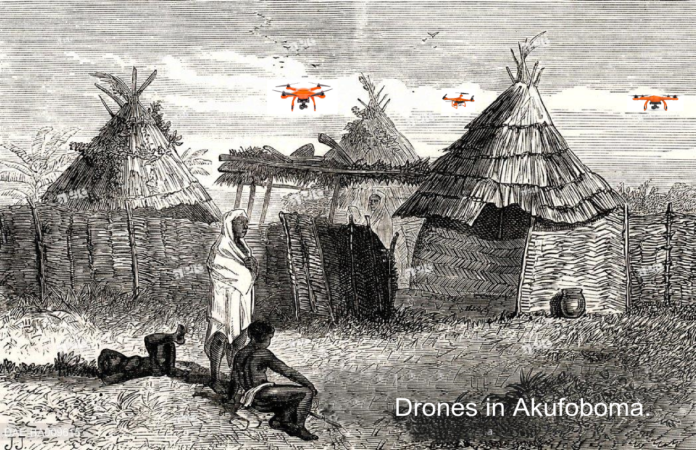AKUFOBOMA—There’s a new story in Akufoboma (Akufo town). Twenty farmers suffered bad weather one year. The drought killed all crops. The village borrowed food from another village to feed themselves and their animals. Before the next planting season, the farmers decided to be proactive in case there was another drought.
They got together and the farmer with the biggest head suggested that they needed the largest and most advanced drone system to survey water clouds in order to know when exactly to plant crops. The rest thought that this was a fantastic idea. And it was. The twenty farmers sold their cattle—the ones they used to till the soil the last year—and invested the money in a drone distribution base and twenty drones. Since they couldn’t operate the drones themselves, they hired a drone expert from far, far away to help them man their drones.
Planting season arrived. The drones helped the farmers predict the correct time to plant—in three weeks. Although there were no cows and bulls to help till the soil. The farmers had to do it all by hand. Instead of the three week period it usually took to till the soil and prepare the land for planting, the farmers took seven weeks to do it by hand. The land wasn’t prepared in time and the farmers could not plant their crops in time.
Yet again that year, the crops failed. The farmers and the village had to borrow food from another village to feed themselves. What should the farmers do next season? The drones could only help predict rain two to three weeks in advance. It took seven weeks to prepare the land. The chief farmer, the one with the next biggest head, suggested that they sell their homes and buy some cattle to help them till the soil.
The farmers sold their homes, bought a couple bulls and cows, and left the village to settle with other family and friends. The next season arrived. With the help of the drones they were able to predict yet the start of the new planting season. The farmers started preparing the land. Midway, they realized that it took them more than double the time to it took last season to arrive at their farms from their new residences. As a result, the farmers took more than double the time to reach their farms, and seven weeks to prepare the land by hand. They could not take the new bulls and cows they had purchased the distance, to their old farms. They still had to till the soil by hand.
The rains came too early and the crops failed. What should the farmers do? One of the farmers, the one with the next biggest head, suggested that they sold their farms. That is when every other farmer woke up. “Wait a second,” said one farmer. “How are we going to feed our children?” one farmer asked. “We can help the other farmers in the other village with their farms,” said another. “I can’t do that,” said another farmer. After several murmurs, cries, shouting and arguing, the chief farmer, the one with the biggest head, suggested that they sell the drones and get back the money to buy back their homes and cattle.
The farmers decided to sell the drones and the drone distribution center in order to buy back what they had before—their homes and their cattle. They also needed the money to foot the bills (the food) they had borrowed from other villages from before to feed themselves, their animals and their children. Yet, no village wanted the drones. Even villages suffering that year from droughts would not buy drones to help them better predict the weather. The village next door wasn’t interested. Neither was the village far, far away. Although all these other farmers in all these other villages had smaller heads, much smaller heads!
After about a year of trying, and failing to sell the drones, the Akufo farmers gave up. They sought seasonal work with farmers from other villages in the next planting season, and the next one after that. And the next one! Unable to pay and repay their debt to other farmers, Akufo farmers became the talk of the world. So, other farmers who knew these farmers from the town of Akufo became curious. They asked what had happened to the farms, cattle and homes of Akufo’s farmers.
One answer. They bought drones and built a drone distribution center. The other farmers from the other villages, frustrated, would ask, “What is that?” The bellowing answer that remained was always: “We have no idea.” Why should they? Why, in Hell, should they know what a drone is, at all?











Beautiful write up.
Good to see the farmers are alive, not six-feet under from a snake bite in the 21st century, because serum and essential critical medical consumables could be ‘droned’ to his remote farming village health post for the nurse to administer on him or his kin, under the telephoned supervision of a medical consultant several several miles away.
Really? You actually think that’s how snake bites, anti-venoms and nurses work? Interesting. Let me refer you to a Dr.
Narmer Amenuti Tnx for the reference.
Waiting to hear from Dr.
She might teach me a thing or two my wife does not know about primary health emergency services in rural Ghana on her tours throughout Ghana every year.
Not against using technology to solve some of our problems but this drone carrying blood to CHPS compounds to community heath nurses who are not licensed to transfuse blood and don’t even have the equipment to do the the most insane idea of the century
Hahaha this is more than an allegorical piece. Well done.
Please why should a farmer need to know about drones? People have been farming and dealing with snake bites for centuries upon millennia. Nothing a drone can do that the people themselves cannot already do.
It’s a pity you don’t have a donate button! I’d certainly donate to this excellent blog!
I suppose for now i’ll settle for bookmarking and adding your RSS feed to
my Google account. I look forward to brand new updates and will talk about this website with my Facebook group.